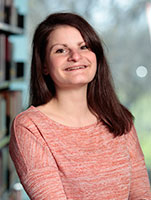Choosing a research programme
Alina, from Latvia, chose an integrated masters-PhD programme to help broaden her knowledge and develop her skills.
How it came together

I decided to apply for the integrated 1+3 MSc/PhD programme after completing a research project in computational neuroscience.
The programme at the University of Edinburgh seemed like a perfect match, combining my passion for computer science and my desire to apply mathematical theory into a meaningful biological and medical context.
The 1+3 structure
The majority of funded PhD options that I came across are 1+3 degree structures. This was very beneficial to me because I was moving from computer science to neuroscience and I needed to gain insight into biology.
The first year masters project informed my decision to complete a computational PhD project and to select a supervisor who shared this interest.
Key to success
I’m enjoying my time at Edinburgh because of the sense of community and social cohesion. It is very normal practice to just knock on somebody’s door and say, “Hey, can I talk to you about my problem?”
The curiosity, interest, and motivation I have to discover more about the world is what drives me forward.
To be successful on a research postgraduate degree, it is important to have the ability to work independently and the motivation to develop your own novel and creative research.
Choosing a postgraduate degree
Discover the best type of postgraduate research programme for you.


